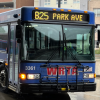Hours after the Boston Marathon bombing suspects were identified as Muslims, the Islamic community there began to fear the worst. But instead of the violence that happened after Sept. 11, Muslims in Boston say — for the most part — they didn’t experience backlash.
“As a limousine driver, I meet too many different peoples," said El-Sir Sinousi. "And I talk to too many different peoples.”
Inside the soaring mosque in Roxbury, Sinousi tells stories about the people he meets on the job — like this one from a couple of months after the marathon bombings.
Sinousi recalled a Pakistani customer who asked him how things were after the marathon — whether or not racial profiling or other discrimination took place. The man said, "When I heard the news, I start praying to Allah: Don’t let it be a Muslim."
“We never experienced those things here,” Sinousi said. "Boston is the best anyway!"
In this city that’s certainly experienced its share of racial strife, Sinousi says his neighbors went out of their way to be kind. When his friend’s wife was scared to go outside, because she thought her head scarf would make her a target, a neighbor offered to take her shopping, and even began picking up and dropping off her kids from school.
"People were really committed to the Golden Rule," he said. "It was powerful."
Sohaib Willem Webb, the imam at the Islamic Society of Boston Cultural Center, the largest mosque in New England, was, at first, really worried about what the bombing meant.
"There was a concern of, 'Was it any of our community members?'" he said. "Were they involved? If so could we have been more involved in preventing the issue?"
It turns out bombing suspect Tamerlan Tsarnaev wasn’t a congregant. But he occasionally attended a mosque in Cambridge that is affiliated with Webb’s. Tsarnaev was reportedly thrown out after he stood up during services and shouted at the imam.
Webb says he would have handled the situation differently.
"If that was here, I would have met with him after the prayer, talked with him, tried to assess where his head was at," he said.
Looking back a year after the bombings, Webb says he’s impressed with the way Boston handled itself.
"At all levels, at a policy level, the lawmakers, law enforcement citizens — it’s a model," he said.
The Council on American-Islamic Relations monitors hate crimes against Muslims. The group's Ibrahim Hooper says there’s been no significant increase in reports of harassment, assaults or damage to mosques since the marathon bombings.
"Right after it occurred, we had two or three scattered reports of people being accosted in the streets," Hooper said. "But I wouldn’t say it was, by any means, a widespread phenomenon."
In the media, there was some some hostility towards Muslims. Commentators and activists who have spouted anti-Islamic views before took to Twitter and the airwaves. One example: On MSNBC, former Republican U.S. Rep. Joe Walsh, of Illinois, argued that in the wake of the bombing, law enforcement should racially profile young Muslim men as part of the immigration process.
“We’re at war, and this country got a stark reminder last week again that we are at war, and not only should we take a pause mark when it comes to immigration, we need to begin profiling who our enemy is this war: young Muslim men,” Walsh said.
But American Muslim leaders say overall, politicians and the media have behaved responsibly.
“So I think that we learned a lot in the years since 9/11, so that by the time we come to the Boston bombing we are very much more sophisticated,” said Farah Pandith, formerly the representative to Muslim Communities for the U.S. State Department, now at Harvard University. “We are having conversations about hate speech. We’re having conversations about discrimination and bigotry. We’re having conversations about how we think about security — all wrapped up in a post 9/11 ecosystem.”
Pandith says she also sees American Muslim communities trying to build relationships with other Americans instead of being insular.
Yusufi Vali, executive director of the Islamic Society of Boston, credits those relationships for the decrease in prejudice.
“This community for the last 13 years, ever since 9/11, has opened its center, invited people in, went out to know our neighbors, got to know people from other faiths, gotten to know political leaders, and off of those relationships that have been built, people have realized that we’re just one of them.”
Vali says that what happened in Boston last year was a tragedy, but it also tested how much things had changed.



